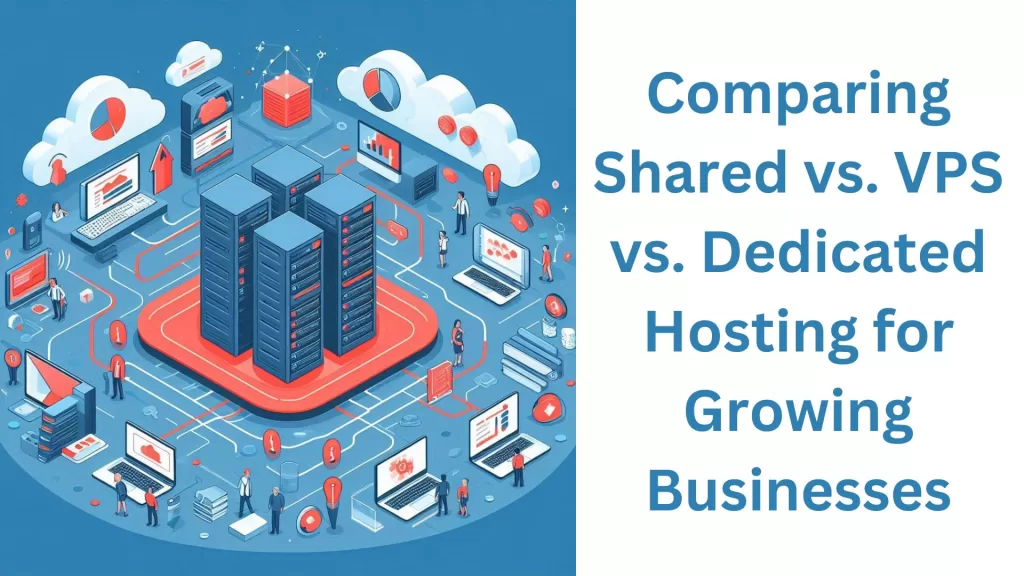Introduction
Choosing the right hosting solution is crucial for any growing business. The performance, reliability, and scalability of your website largely depend on the hosting type you select. With various hosting options available, it can be challenging to determine which one is the best fit for your specific needs and budget. In this article, we will compare three popular hosting types: shared, VPS (Virtual Private Server), and dedicated hosting. We’ll outline the pros and cons of each, as well as recommend providers that cater to different business requirements.
1. Shared Hosting
Shared hosting is the most affordable hosting option, making it a popular choice for startups and small businesses. In this setup, multiple websites share the same server resources, which means that costs are divided among all users.
Pros:
- Cost-Effective: Shared hosting is the most economical option, making it accessible for businesses with limited budgets.
- User-Friendly: Most shared hosting plans come with intuitive control panels, making it easy for beginners to manage their websites.
- Maintenance-Free: Hosting providers handle server maintenance, security updates, and technical support, allowing business owners to focus on other aspects of their operations.
Cons:
- Limited Resources: Since resources are shared among multiple users, high traffic on one site can affect the performance of others.
- Less Control: Users have limited access to server configurations and settings, which can be a drawback for more advanced users.
- Security Risks: If one website on the shared server is compromised, others may also be at risk.
Recommended Providers:
- Hostinger: Known for its affordable pricing and excellent customer support, Hostinger offers shared hosting plans suitable for small businesses.
- Bluehost: A popular choice among beginners, Bluehost provides reliable shared hosting with easy WordPress integration and a user-friendly interface.
2. VPS Hosting
VPS hosting is a step up from shared hosting, providing users with their own dedicated resources on a virtual server. While multiple websites still share the same physical server, each VPS operates independently with its own allocated resources.
Pros:
- Improved Performance: With dedicated resources, VPS hosting offers better performance and faster load times compared to shared hosting.
- Greater Control: Users have more control over server configurations, allowing for greater customization and flexibility.
- Enhanced Security: The isolation of VPS environments means that if one site is compromised, others remain unaffected.
Cons:
- Higher Cost: VPS hosting is more expensive than shared hosting, which may not be suitable for very small businesses or startups.
- Technical Knowledge Required: While some VPS providers offer managed services, users may need technical knowledge to effectively manage their servers.
Recommended Providers:
- A2 Hosting: A2 Hosting is known for its high-performance VPS hosting with excellent customer support and a variety of plans to suit different needs.
- InMotion Hosting: Offering both managed and unmanaged VPS options, InMotion Hosting provides reliable service with robust features and good uptime.
3. Dedicated Hosting
Dedicated hosting provides an entire physical server dedicated solely to one user or organization. This option is ideal for large businesses or those with high traffic volumes that require maximum performance, security, and control.
Pros:
- Maximum Performance: Dedicated hosting ensures optimal performance, as users have exclusive access to all server resources.
- Full Control: Users have complete control over server configurations, allowing for tailored setups based on specific needs.
- Enhanced Security: With no other websites on the server, dedicated hosting offers the highest level of security and isolation.
Cons:
- Costly: Dedicated hosting is the most expensive option, making it unsuitable for smaller businesses with tight budgets.
- Requires Technical Expertise: Users need a good understanding of server management to take full advantage of dedicated hosting.
Recommended Providers:
- Liquid Web: Liquid Web specializes in managed dedicated hosting, offering high-performance servers with exceptional support and features.
- HostGator: Known for its flexible plans and robust performance, HostGator provides dedicated hosting solutions suitable for businesses of all sizes.
Conclusion
When selecting a hosting solution for your growing business, it’s essential to weigh the pros and cons of shared, VPS, and dedicated hosting. Shared hosting is a great starting point for small businesses on a budget, while VPS hosting offers a good balance of performance and cost-effectiveness for growing websites. Dedicated hosting, although more expensive, is ideal for large businesses that require maximum resources and security.
By understanding the differences between these hosting types and evaluating your specific needs and budget, you can make an informed decision that supports the growth and success of your online presence.




